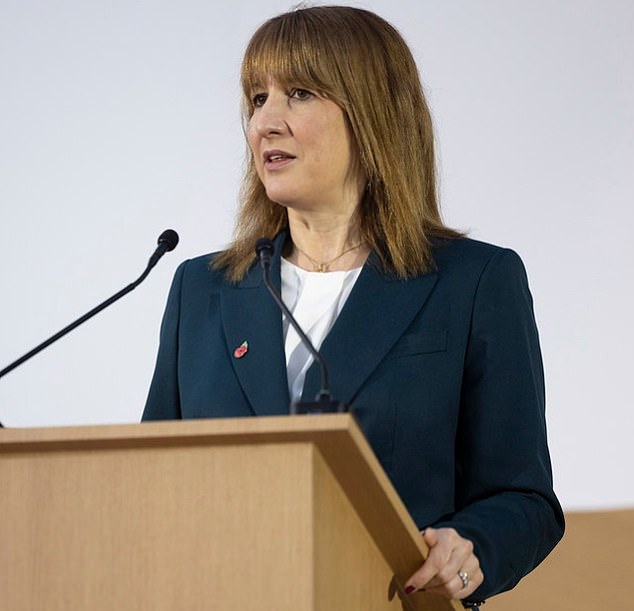Rachel Reeves has suffered a fresh blow ahead of her Budget next month following a larger-than-expected downgrade to official productivity forecasts, it has emerged.
The Office for Budget Responsibility (OBR) watchdog is reportedly poised to cut its trend productivity forecast by about 0.3 percentage points in its upcoming projections.
It is estimated this will open a fresh hole in the public finances of more than £20billion as the Chancellor attempts to put together her latest fiscal package.
This will increase the size of Ms Reeves’ task in balancing the books and will put Britons on alert for even bigger tax hikes on 26 November.
There has already been speculation she could break Labour’s manifesto pledges and raise income tax, while the Treasury is also considering proposals for a ‘mansion tax’.
The Chancellor on Monday acknowledged the OBR was likely to downgrade its productivity forecasts due to the UK’s ‘very poor’ record.
Speaking in Riyadh in Saudi Arabia, Ms Reeves also said she was ‘of course’ looking at tax increases – as well as spending cuts – in her bid to balance the books.
She reiterated the need to meet Budget rules requiring her to bring down borrowing and debt – with enough room to spare in case of unexpected problems in the future.
Rachel Reeves has suffered a fresh blow ahead of her Budget next month following a larger-than-expected downgrade to official productivity forecasts, it has emerged

Speaking in Riyadh in Saudi Arabia on Monday, the Chancellor said she was ‘of course’ looking at tax increases – as well as spending cuts – in her bid to balance the books
The Chancellor said: ‘We are looking, of course, at tax and spending to ensure that we have resilience against future shocks by ensuring we’ve got sufficient headroom, and also just ensuring that those fiscal rules are adhered to.’
One Labour official told the Financial Times there was ‘fury’ in No10 and the Treasury that the OBR has decided to deliver its productivity downgrade now, rather than before last year’s general election.
The Institute for Fiscal Studies think tank has said a 0.1 percentage point downgrade to the productivity forecast would increase public sector net borrowing by £7billion in 2029–30.
This means a 0.3 percentage point cut could create a £21billion hit for Ms Reeves, at a time when she is already thought to be facing a multi-billion pound spending hole.
A Treasury spokesperson said: ‘We won’t comment on speculation ahead of the OBR’s forecast, which will be published on November 26.’
Ms Reeves last week declined to rule out an income tax rise at the Budget.
Asked about reports that the Treasury is in active discussions over raising the rate, the Chancellor said on Friday she would ‘continue to support working people by keeping their taxes as low as possible’.
She added she was still ‘going through the process’ of writing her Budget.
Housing Secretary Steve Reed on Monday repeatedly refused to rule out a ‘mansion tax’ being imposed by the Chancellor.
It was this weekend revealed how Ms Reeves could hit those with homes worth more than £2million with a punitive levy in the Budget .
Under the proposals, reported by the Mail on Sunday, the owners of properties worth £2million and above would face a charge of 1 per cent of the amount by which the property exceeds that value.
That would mean the owners of a £3million property would face a bill of £10,000 every year.
But the plans have been widely condemned by property experts and a former Bank of England governor.
Research from the Resolution Foundation think-tank has shown that the ‘effective tax rate’ charged to the average worker was at its highest for more than a decade, with those on the median salary of £33,000 paying 27 per cent.
The analyis showed the ‘effective tax rate’ – which includes employer National Insurance (NI) – for low and middle earners has been rising.
Those workers had seen the rate fall under the Tories in the 2010s as they benefited from higher taxfree allowances – the amount that can be earned before any income tax is due – as well as cuts in employee NI, the report said.
The think-tank also noted that the recent increase in employer NI has widened a ‘damaging tax gap’ between employees and the self-employed to record levels.
And it said there was ‘plenty of evidence’ that employer NI ‘is ultimately paid for by the employee’.
Tory shadow business secretary Andrew Griffith said: ‘With the effective tax rate the highest for 13 years and millions on welfare instead of working, Rachel Reeves should be cutting taxes not raising them.’


